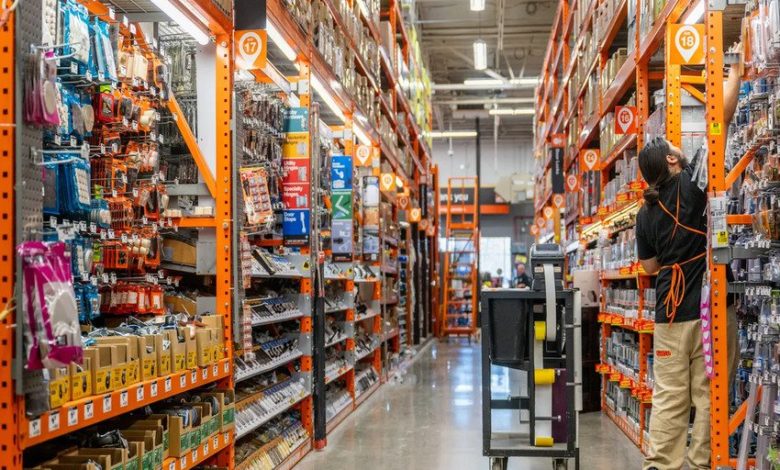Home Depot In The Crossfire: Tariffs, Deportations & A Growing Public Backlash

As the largest home improvement retailer in the U.S., Home Depot (NYSE:HD) has long been seen as a bellwether for the health of the American housing and construction sector. But recent developments in 2025 have placed the company at the heart of two highly charged political and economic issues — escalating tariffs and immigration enforcement. The company is navigating a storm of external pressures as President Donald Trump ramps up his immigration crackdown, explicitly targeting locations such as Home Depot parking lots to conduct mass deportations of undocumented day laborers. At the same time, Home Depot is contending with a shifting trade landscape, working aggressively to shield its customers from the rising cost of imported goods amid ongoing U.S.-China tariff escalations. As public scrutiny intensifies and macroeconomic uncertainties linger, investors and consumers alike are beginning to question whether the retailer can maintain stability in an environment fraught with reputational and operational risks.
ICE Raids & Home Depot Parking Lots: The New Frontline of Immigration Enforcement
Home Depot has become an unwitting symbol in the national debate over immigration, particularly in light of the Trump administration’s renewed push to target undocumented immigrants. Day laborers, many of them undocumented, have historically congregated in or near the retailer’s parking lots to connect with contractors and homeowners looking for quick help on renovation or construction jobs. This informal ecosystem, which Home Depot has neither endorsed nor directly facilitated, has persisted for decades. But in recent months, Home Depot stores have increasingly become hotspots for Immigration and Customs Enforcement (ICE) raids, especially after senior Trump aide Stephen Miller explicitly instructed ICE agents to patrol areas such as Home Depot and 7-Eleven locations. The raids have prompted a sharp decline in the presence of day laborers at many stores, particularly in heavily Latino neighborhoods in cities like Los Angeles, Houston, and the Bronx. While Home Depot maintains that it does not coordinate with ICE and has a standard procedure to allow employees to leave with pay during such raids, the fallout has included public protests, worker anxiety, and legal action. In one incident in New York, ICE agents detained multiple individuals at a Home Depot parking lot, prompting civil rights organizations to allege unconstitutional detainment practices. The visibility of these raids has sparked both activist outrage and political debate, placing Home Depot squarely in the middle of a contentious national conversation — not for its business practices, but for what is happening on its property. These developments risk tarnishing the company’s brand among segments of the public, especially in immigrant-heavy communities, while also alienating contractor customers who rely on these informal labor markets for staffing.
Political Heat & Brand Perception Risk Amid Immigration Protests
The immigration enforcement actions at and around Home Depot locations have triggered protests and condemnation from labor rights groups, further escalating the public relations risk facing the company. Organizations such as the National Day Laborer Organizing Network (NDLON) have urged Americans to show solidarity by physically gathering at Home Depot stores in protest of ICE raids. Civil liberties groups have criticized the company for not doing enough to protect vulnerable laborers, while some anti-immigration factions accuse it of turning a blind eye to illegal labor practices. These conflicting narratives have created a minefield of perception for Home Depot, especially as social media amplifies confrontations between day laborers and security staff. For instance, viral footage of a Honduran immigrant being expelled from a store lot by security with a German shepherd in tow sparked outrage online. Although Home Depot clarified that bathrooms are technically open to the public and that security guards have discretion, these nuanced responses have done little to quell the perception that the company is either complicit in or indifferent to the raids. The negative headlines come at a time when the company is already grappling with slowing sales growth and increased pressure from competitors. Furthermore, the situation has sown uncertainty within the contractor community — a key customer segment — some of whom are expressing concern over their own labor sourcing risks and the long-term sustainability of project staffing. In an industry where relationships and trust matter, especially with Pro customers, this perception battle may have downstream impacts on customer loyalty and brand equity.
Tariff Pressures & Global Sourcing Realignment
Parallel to its immigration controversies, Home Depot is also facing mounting challenges tied to U.S. tariff policy. With the resumption of trade tensions between the U.S. and China under the current administration, the retailer has had to rethink its sourcing and pricing strategies. CFO Richard McPhail recently reiterated that the company intends to hold prices steady despite new tariffs, a position that stands in contrast to competitors like Walmart, which announced price hikes. To manage this, Home Depot has ramped up pressure on its suppliers to either absorb the costs or shift production outside of China. The company estimates that within 12 months, no single country (excluding the U.S.) will account for more than 10% of its imports — a sign of strategic diversification. Still, this transition comes with trade-offs. Some suppliers are exiting product lines that no longer make financial sense under new tariff structures, which could affect product availability. Additionally, absorbing tariff costs internally or pressuring vendors could erode margins over time. Home Depot’s gross margin for Q1 2025 dropped 35 basis points year-over-year, partially due to mix effects but also indicative of cost headwinds. While the company maintains confidence in its pricing elasticity and SKU-level management tools, the long-term sustainability of this tariff absorption strategy remains uncertain, especially if trade tensions escalate further. The risk is not just economic but operational, as rapid diversification could stress logistics, quality control, and supplier relationships — all of which are critical for Home Depot’s ability to maintain its customer value proposition.
Balancing Profitability & Policy: Margin Compression & Public Accountability
Home Depot’s decision to maintain pricing in the face of tariff pressure and volatile macroeconomic conditions speaks to its long-term market share ambitions. However, this strategy may come at a short-term cost. The company reported adjusted EPS of $3.56 in Q1 2025, down from $3.67 in the year-ago period, and operating margins also compressed to 12.9%, down from 13.9%. While part of the margin impact stemmed from the SRS acquisition and FX headwinds, executives acknowledged that increased SG&A and tariff-related supply chain adjustments contributed to the decline. Moreover, with the integration of SRS and expansion of its Pro ecosystem, Home Depot is taking on new cost structures — including trade credit programs and logistics upgrades — that will require ongoing investment. Simultaneously, the reputational damage from being associated with deportation raids could dampen brand affinity, particularly in immigrant-heavy regions where store footfall might be impacted. The combination of public controversy, government scrutiny, and increased operational costs introduces a level of strategic risk that could weigh on near-term financial performance. With no clear resolution to the tariff issue and immigration enforcement still a top priority for the federal government, Home Depot must continue to walk a fine line between corporate responsibility and commercial performance. Investors must evaluate whether the company's multi-pronged strategy — resisting price hikes, maintaining customer trust, and managing public backlash — can sustainably offset margin pressures and avoid long-term reputational damage.
Final Thoughts
Source: Yahoo Finance
Home Depot’s stock has seen its fair share of volatility along with broader markets over the past few months as the management finds itself caught between volatile federal policy shifts and the expectations of its diverse customer base. While the company’s pricing resilience and supply chain diversification efforts are notable, its proximity to immigration enforcement actions and the resulting media coverage have complicated its public narrative. These parallel challenges — one rooted in geopolitics and the other in domestic enforcement — are testing the company’s ability to protect both margins and brand equity.




